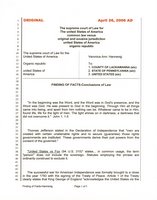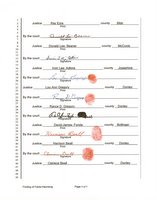Taxes, "Class of Subject", and Economic Realities in Pennsylvania
I recently sent out e-mails to Pennsylvania Senator Mellow and Representative Wansacz asking them to provide their influence to gain support for "The Constitution Restoration Act of 2004"; H.R. 3799, and S. 2082. Both replied to my e-mails stating that those were "federal" issues. I responded to Senator Mellow's reply by specifically defining his circle of "influence"; friends, family, and political party associates. I closed my message thanking him for his response and that (in true democratic process) I'll be passing on his reply to others who are concerned about what is happening in this nation as a result of representatives who "listen" to the people, but are either unable or unwilling to "hear" what they are saying.
On March 4, 2004, I received a phone call from "Jill" from Senator Mellow's office apologizing for sending me the canned (my word) e-mail response. I attempted to engage her in a discussion about the responsibilities delegated to the Commonwealth's Senate by Article 1, Section 3, of the United States Constitution and how their responsibilities were relinquished by apparently treasonous Commonwealth Senators just prior to the ratification of the 17th [XVIII] Amendment in 1913. Jill didn't seem to be familiar with either the Pennsylvania, or the US Constitutions. When I said I was asserting my inquiry based on Article 1, Section 17, of the Pennsylvania Constitution, her reply indicated to me that she heard nothing more than the number "17".
Because of time constraints I e-mailed the links to all the Constitutional sections for her consideration the following day. As an afterthought I recalled that during the course of our conversation she asked my thoughts on taxation. The following was my e-mail response to her yesterday.
"Jill;
This is an addendum to your questioning me about "taxes" during our telephone conversation on Thursday, 3/4/04.
Since you answer questions on behalf of Senator Mellow, I take it that your position is funded by the taxpayers in Pennsylvania. I was wondering if you ever stopped to considered where the money in your paycheck comes from? I have; and here is what I've come to realize:
"When a man is paid one $10.00 bill for his labor, the federal tax collected by the Internal Revenue on behalf of the owners of the Federal Reserve is approximately 20%, or $2.00. The $10.00 "bill" (according to the "Fed101" website) cost the Federal Reserve approximately 4.2 cents to print. According to that website, regardless of the denomination of the bill, the cost is the same; 4.2 cents ($0.042) whether it's a denomination of $1.00, $5.00, $10.00, $50.00 or $100.00.
"Although the laboring man perceives his earnings to be $10.00, the actual breakdown of his remuneration appears to be that the owners of the Federal Reserve profit $9.958 for printing the $10.00 bill, plus another $2.00 from the Federal Tax collected by agents of the IRS.
"Of that same $10.00, the Commonwealth of Pennsylvania collects an additional 3% tax (.30), and local taxes at 1% (.10). Social Security and Medicare taxes are another 8% (.80). As you can see, this is an additional $1.20 that is deducted from the laboring man's perceived remuneration of $10.00.
"As I see it, approximately $13.18 is the laboring man's debt to this present form of government in Pennsylvania for each $10.00 of his labor; $11.96 to the owners of the Federal Reserve, an additional $.80 to social programs, $.10 for local administration, and $.30 for people like yourself who "listen", but are either unable or unwilling to "hear" what the people are saying and/or asking.
"Now knowing that your paycheck is derived from the plunder of the labor of your neighbors, what do you consider "fair taxation"? Where does "property tax" fit in with this current form of Corporate Vassalage; for those who have the status - by definition - of an indentured servant, slave, or (as found in the "Taxation and Finance" portion of the Article VIII of the PA Constitution) "class of subject"?"
In addition; if you happen to know the role that Free Masons played in the history of Lackawanna County, Pennsylvania you may be interested in reading an article by J. B. Campbell entitled Our Masonic Constitution.









<< Home